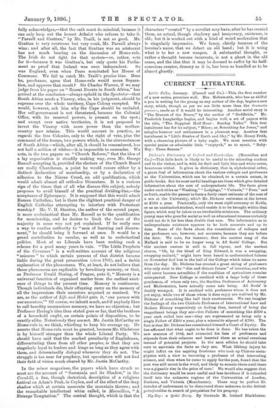Dickens's Dictionary of Oxford and Cambridge. (Macmillan and Co.)—This little
book is likely to be useful to the intending student and to the visitor, and is, with its dark and light blue and white cover, beauteous withal. It gives in dictionary, that is, alphabetical order, a great deal of information about the various colleges and professors at the Universities, which can be obtained, to a certain extent, in guide-books. But its most useful headings are those which give detailed information about the cost of undergraduate life. The facts given under such titles as "Washing,"" Lodgings," "Victuals," "Fees," and so forth, enable the parent to form a fairly exact estimate of the coat of a son at the University, which Mr. Dickens estimates at the lowest at E104 a year. Practically, only the most rigid economy at Koble, or as an unattached student, would enable it to be brought within that figure, which may be taken as an irreducible minimum. The ordinary young man who goes for social as well as educational reasons certainly could not do it for less than doable that sum. The information as to undergraduate existence appears to be both accurate and up to date. Some of the facts about the constitution of colleges and the professors are, however, not accurate, because they are before the date. We note, for instance, that the ancient song of the Mallard is said to be no longer sung in All Souls' College. But this ancient custom is still in full vigour, and the ancient chorus, "Oh, by the blood of King Edward, it was a swapping, swapping mallard," might have been heard in undiminished fulness on November 2nd last in the hall of the College which takes its name from the day. Mr. Dickens has created a great string of professors who only exist in the "dim and distant future" of intention, and who will never become actualities if the condition of agriculture remains unimproved. New College is credited with a large body of these gentlemen, of whom only two, the Savilian Professors of Astronomy and Mathematics, have actually come into being. All Souls' is doubly wronged. It is credited with professors whom it does not yet enjoy, while two of those whom it does enjoy are mulcted by Mr. Dickens of something like half their emoluments. We can imagine the feelings of the two Chichele Professors of International Law and Modern History respectively on finding that, instead of being the magnificent beings they are—five Fellows of something like 2300 a year each rolled into one—they are represented as being only a single Fellow of £200 a year, plus a miserable stipend of 2700. The fact is that Mr. Dickens has constituted himself a Court of Equity. He has affirmed that what ought to be done is done. He has taken the new statutes of 1882, and extracted his lists of professors and stipends from their columns and inserted them as actual creations instead of potential projects. In the next edition he should take care to ascertain the facts as they are. What lifelong injury he might inflict on the aspiring freshman who took up Chinese meta- physics with a view to becoming a professor of that interesting science, and then when he came to apply for the post, found that the post was still uncut in the wood, and likely to remain there until there was a gigantic rise in the price of corn! We would also suggest that the dictionary would be more useful and less invidious if it extended itself into the unknown regions of the Universities of London, Durham, and Victoria (Manchester). There may be perfect El- dorados of endowment to be discovered there unknown to the British paterfamilias in search of perquisites for his progeny.
















































 Previous page
Previous page